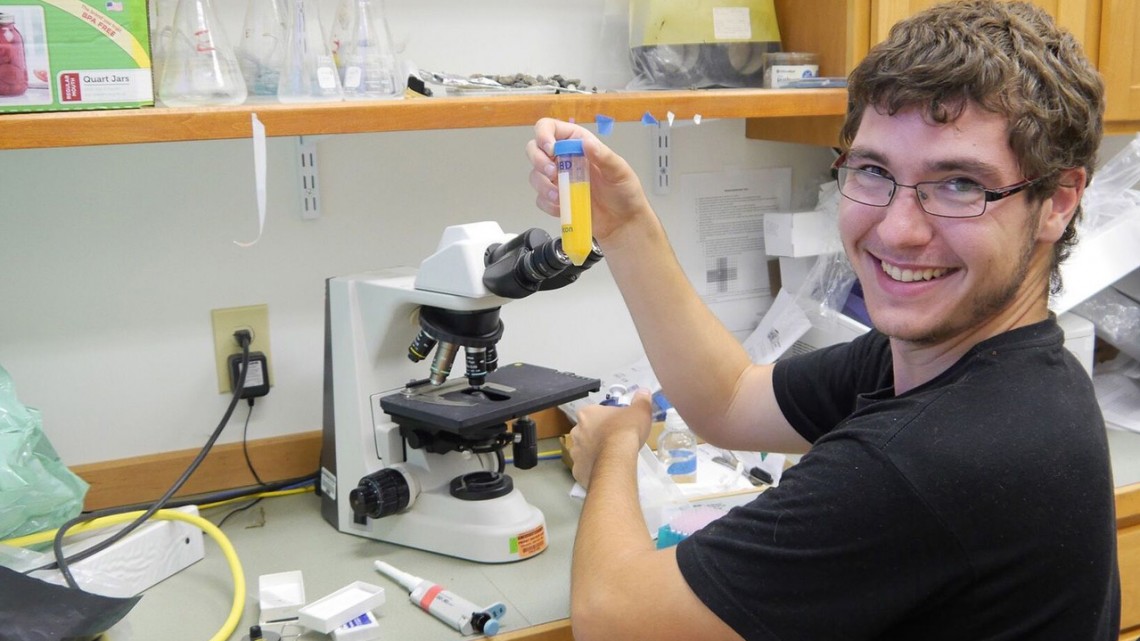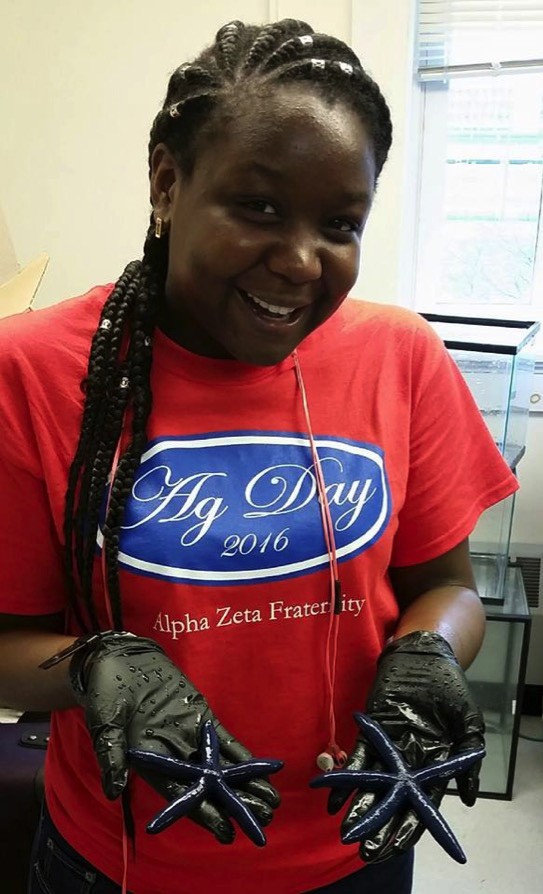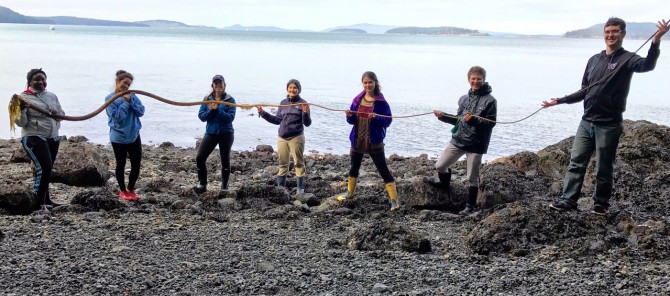
Evan Fiorenza '17 works in the lab, following a day out in the field in Washington.
CORALS scholars to explore health of Pacific waters
By Blaine Friedlander
This spring, six undergraduate students will toss away wool socks, surrender winter coats and flee the Northeast’s slushy roads to gauge ocean health along the Hawaiian and Washington state coasts.
It’s far from a surfing safari. It’s an immersive full-semester for undergraduate students in the Cornell Ocean Research Apprenticeship for Lynch Scholars (CORALS) program.
“Yes, it’s so warm, sunny and tropical, but we do a lot of the work in Hawaii – and later in the semester in Washington state – it’s all field-based research,” said Phoebe Dawkins ’16, who completed the program in her senior year and now serves as the CORALS program coordinator. “The students conduct underwater surveys and sampling all the time. We are out in the elements for most of the day. We work all day – and sometimes all night.”
Students in the forthcoming 2018 CORALS program are Samantha Burke ’19, Emily Chei ’19, Sukanya Dayal ’19, Arjun Hausner ’20, Taylor Hughes ’18 and Chloe Mikles ’20.
Burke, for example, has studied the development and replacement of teeth in fish. Working in the waters off Hawaii and at the University of Washington’s Friday Harbor Labs will advance her scientific dexterity.
“I am looking forward to trying new research areas and gaining additional skills,” Burke said.
Growing up in Southern California, Hughes ’18 looks forward to how the CORALS program “will expose me to two completely different marine ecosystems that I have never experienced.”
The students’ work will include examining pollution effects on coral reefs, testing water quality, studying how climate change and ocean acidification impact on marine animals and preparing research for publication. The central goal is for students to embark on field-based, publishable projects, led by top researchers from Cornell.
Drew Harvell, professor of ecology and evolutionary biology, directs the four-year-old CORALS program, which enables students to hone research, field, lab and writing skills. Students receive course credits for work on marine biodiversity, conservation oceanography and other topics.
The program uses a near-peer mentoring approach, with research projects led by Harvell and Charles Greene, professor of Earth and Atmospheric Sciences, along with postdoctoral researcher Joleah Lamb and doctoral students. Harvell and Greene are fellows at Cornell’s Atkinson Center for a Sustainable Future. Research by the program – with students as co-authors – has been published in peer-reviewed journals, including Science and Diseases of Aquatic Organisms.
Samarra Scantlebury ’18 studies marine biology and enjoyed her opportunity to conduct extensive field research, but was awed by her front-row view of the deep blue. “We saw sharks, minke whales, humpback whales and dolphins,” she said. “It was amazing to be that close to all of those animals.”
As a graduate student now at the University of Washington’s School of Aquatic and Fishery Sciences, Evan Fiorenza ’17 studies the historical ecology of parasites in fish. He participated in CORALS as a sophomore. “Since I previously had limited exposure to research, this program confirmed my interest in marine research and disease ecology,” he said. “For me, this created hands-on research and publishing opportunities.”
Reyn Yoshioka ’14, one of the program’s original coordinators and a Cornell honors student, helped Harvell teach a class on diversity of marine invertebrates in Washington’s Salish Sea and launch a research project that would later morph into his doctoral research. “The diversity of marine life around the San Juan Islands is phenomenal – and this is coming from someone who grew up in Hawaii,” he said.
Bona fide experience outdoors brings textbooks to life. “You’re exposed to nature all the time, which gives you a chance to see and to experience nature – even when you’re not expecting it,” said Dawkins, who recalled standing knee-deep in an eel grass bed to retrieve samples for lab work.
“A pod of about 30 orca whales swam past our boat – there were babies jumping out of the water, there were mamas breathing at the surface, you could hear their breath, it was just so moving,” Dawkins said. “… It was a wall of orcas, it was an incomparable experience.”
Media Contact
Get Cornell news delivered right to your inbox.
Subscribe

